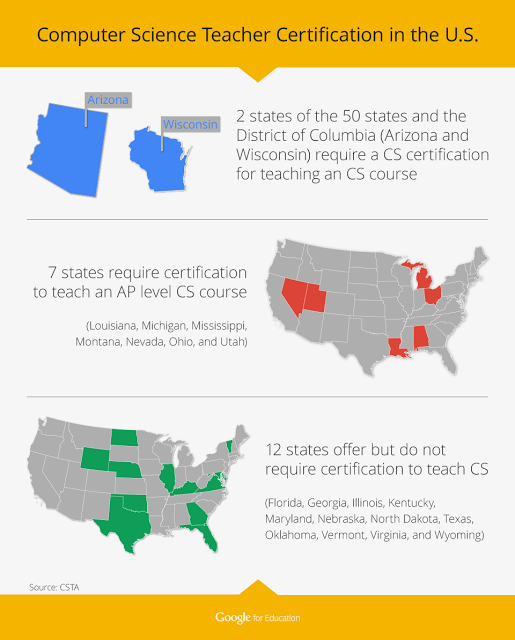
The current state of computer science teacher certification is very much in flux. Many states offer no CS certification courses for middle or high school teachers, and even fewer require teacher certifications before teaching CS classes.
Tech companies such as Google, Microsoft and Oracle are corporate sponsors of the Computer Science Teachers Association (CSTA), which advocates for uniform CS teacher certification policies nationwide. In its 2013 report (funded by Google), “Bugs in the System: Computer Science Teacher Certification in the U.S.,” the CSTA highlighted states in which teachers with no CS experience could teach the subject, and where no certification programs exist to train them.
(Related: Computer science a big priority for employers)
Deborah Seehorn, a member and past chair of the CSTA’s board of directors, said the report’s most glaring theme is that due to confusing and conflicting regulations in all 50 states, CS teacher certification in the U.S. simply isn’t working.
“We find that CS throughout the nation might be taught by a teacher with a formal CS background, or CS might be taught by a teacher who has a different background—perhaps mathematics, science, or business—who has taken professional development courses in order to teach CS,” said Seehorn. “Some states allow any teacher to teach CS courses.”
Teacher certification in every discipline varies on a state-by-state basis, just as it does with CS teacher certification. Seehorn, who is also a business, finance and IT education consultant at the North Carolina Department of Public Instruction, believed that if computer science were considered a “core” subject like mathematics or science (and thus required for graduation), it would help ensure individual state adoption of CS teacher certifications. The CSTA Advocacy and Leadership Team members in every state advocate toward this end.
The CSTA provides an interactive map of states that do or do not offer or require CS teacher certifications.
How the CSTA and Google are trying to help
Founded in 2004 as a subsidiary of the Association for Computing Machinery, the CSTA provides K-12 CS teachers and students a variety of curriculum resources, professional development resources, and certifications. In 2011, it published the CSTA K-12 Computer Science Standards, a framework matched to the Common Core standards for teachers, administrators and policy makers to develop K-12 computer science education offerings in their own states and school systems.
To bridge the gap between the CSTA’s framework standards and the skills a CS educator needs, the organization encourages the computer science community to offer more “methods courses” to bring theory into educational practice.
“One big stumbling block in the CS teacher certification process is the dearth of computer science education methods courses,” said Seehorn. “Whereas mathematics teachers can find methods courses in many colleges and universities, there are few if any offerings for CS teachers. Several states and universities are working to remedy that situation. We are making progress on CS teacher certification, but we are not quite there yet.”
Google recently launched an online course called Computational Thinking for Educators. Aligned with the CSTA’s standards, the free course teaches educators working with students aged 13-18 the fundamentals of computational thinking. The methods course focuses on concrete classroom use cases in posing and explaining complex and open-ended computer-science problems.
“Addressing the issues with the current teacher preparation and certification system is a complex challenge, and it requires the commitment of the entire computer science community,” wrote Chris Stephenson, Google’s head of Computer Science Education Programs, in a blog post. She was previously executive director of the CSTA.
“These kinds of community partnerships are one way that Google can contribute to practitioner-centered solutions, and help further the computer science education community’s efforts to help everyone understand that computer science is a deeply important academic discipline that deserves a place in the K-12 canon, and well-prepared teachers to share this knowledge with students,” she wrote.
A larger federal policy shift, one with the potential to supersede some of the state roadblocks, is currently at the mercy of Congress. The House of Representatives and the Senate are pushing dueling bills to rewrite the Elementary and Secondary Education Act. The Senate’s recent rewrite, passed with bipartisan support on July 16, included a provision to consider Career and Technical Education as “core” courses, which Seehorn hoped is an indicator that CS courses will soon be considered core as well.
“Ultimately, CSTA hopes that every student in the U.S. has access to high-quality CS education provided by a high-quality, certified educator,” she said. “There is an urgent, ongoing and increasing demand for CS professionals in every sector of the U.S. economy. All students need CS education to be able to function capably in the global knowledge economy.”






